常用英语口语8000句:说考试
英语口语考试万能句
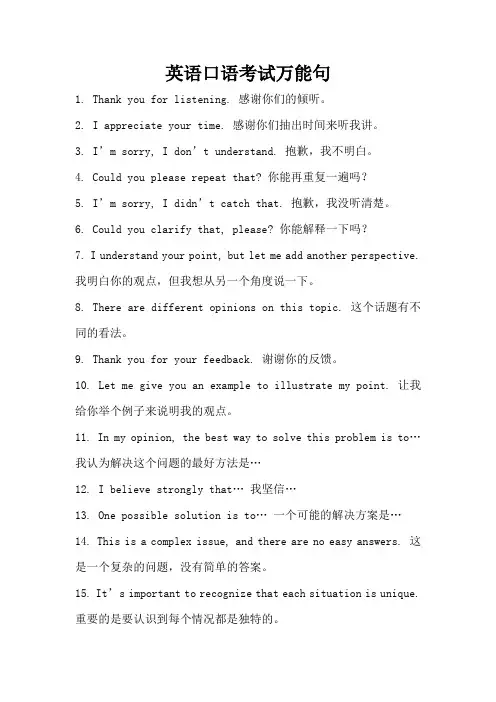
英语口语考试万能句1. Thank you for listening. 感谢你们的倾听。
2. I appreciate your time. 感谢你们抽出时间来听我讲。
3. I’m sorry, I don’t understand. 抱歉,我不明白。
4. Could you please repeat that? 你能再重复一遍吗?5. I’m sorry, I didn’t catch that. 抱歉,我没听清楚。
6. Could you clarify that, please? 你能解释一下吗?7. I understand your point, but let me add another perspective. 我明白你的观点,但我想从另一个角度说一下。
8. There are different opinions on this topic. 这个话题有不同的看法。
9. Thank you for your feedback. 谢谢你的反馈。
10. Let me give you an example to illustrate my point. 让我给你举个例子来说明我的观点。
11. In my opinion, the best way to solve this problem is to…我认为解决这个问题的最好方法是…12. I believe strongly that…我坚信…13. One possible solution is to…一个可能的解决方案是…14. This is a complex issue, and there are no easy answers. 这是一个复杂的问题,没有简单的答案。
15. It’s important to recognize that each situation is unique. 重要的是要认识到每个情况都是独特的。
英语口语8000句(全)
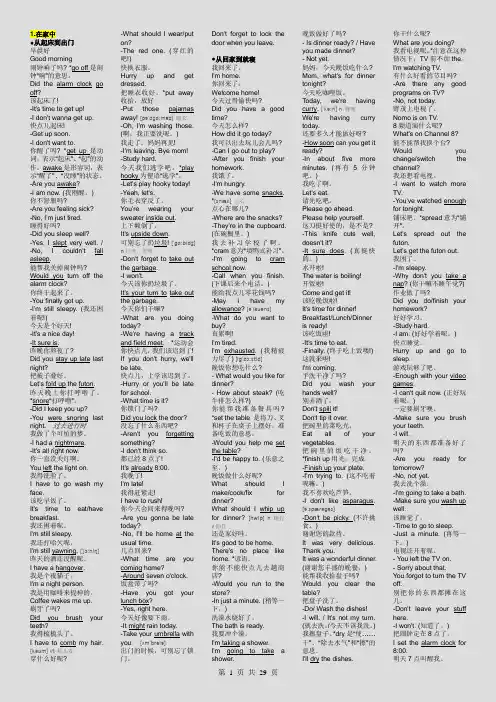
1.在家中●从起床到出门早晨好Good morning闹钟响了吗? *go off是闹钟“响”的意思。
Did the alarm clock go off?该起床了!-It's time to get up!-I don't wanna get up.快点儿起床!-Get up soon.-I don't want to.你醒了吗? *get up是动词,表示“起床”、“起”的动作。
awake是形容词,表示“醒了”、“没睡”的状态。
-Are you awake?-I am now. (我刚醒。
)你不舒服吗?-Are you feeling sick?-No, I'm just tired.睡得好吗?-Did you sleep well?-Yes, I slept very well. / -No, I couldn't fall asleep.能帮我关掉闹钟吗? Would you turn off the alarm clock?你终于起来了。
-You finally got up.-I'm still sleepy. (我还困着呢!)今天是个好天!-It's a nice day!-It sure is.昨晚你熬夜了?Did you stay up late last night?把被子叠好。
Let's fold up the futon.昨天晚上你打呼噜了。
*snore“打呼噜”。
-Did I keep you up?-You were snoring last night. 过去进行时我做了个可怕的梦。
-I had a nightmare.-It's all right now.你一直没关灯啊。
You left the light on.我得洗脸了。
I have to go wash my face.该吃早饭了。
It's time to eat/have breakfast.我还困着呢。
英语口语日常用语8000句
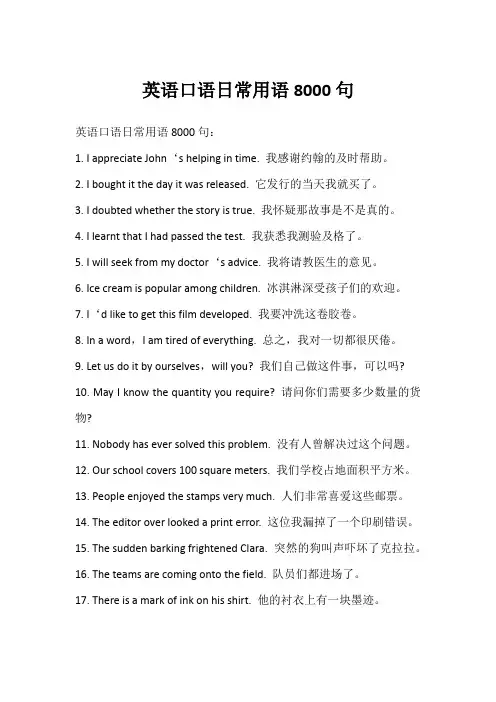
英语口语日常用语8000句英语口语日常用语8000句:1. I appreciate John‘s helping in time. 我感谢约翰的及时帮助。
2. I bought it the day it was released. 它发行的当天我就买了。
3. I doubted whether the story is true. 我怀疑那故事是不是真的。
4. I learnt that I had passed the test. 我获悉我测验及格了。
5. I will seek from my doctor‘s advice. 我将请教医生的意见。
6. Ice cream is popular among children. 冰淇淋深受孩子们的欢迎。
7. I‘d like to get this film developed. 我要冲洗这卷胶卷。
8. In a word,I am tired of everything. 总之,我对一切都很厌倦。
9. Let us do it by ourselves,will you? 我们自己做这件事,可以吗?10. May I know the quantity you require? 请问你们需要多少数量的货物?11. Nobody has ever solved this problem. 没有人曾解决过这个问题。
12. Our school covers 100 square meters. 我们学校占地面积平方米。
13. People enjoyed the stamps very much. 人们非常喜爱这些邮票。
14. The editor over looked a print error. 这位我漏掉了一个印刷错误。
15. The sudden barking frightened Clara. 突然的狗叫声吓坏了克拉拉。
16. The teams are coming onto the field. 队员们都进场了。
英语口语8000句系列
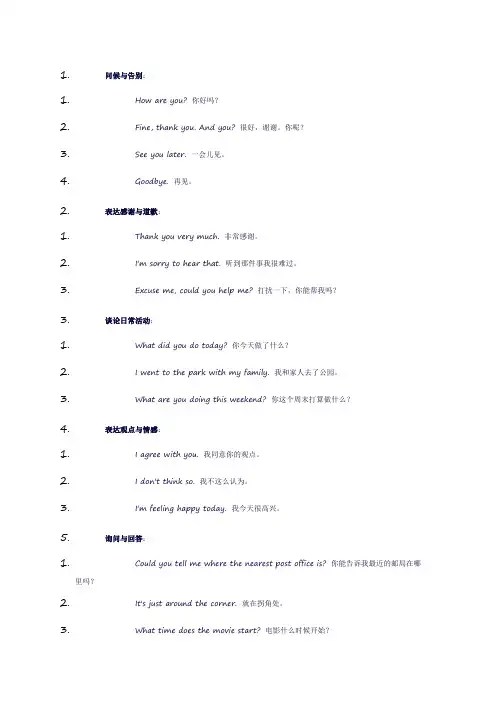
1.问候与告别:1.How are you? 你好吗?2.Fine, thank you. And you? 很好,谢谢。
你呢?3.See you later. 一会儿见。
4.Goodbye. 再见。
2.表达感谢与道歉:1.Thank you very much. 非常感谢。
2.I'm sorry to hear that. 听到那件事我很难过。
3.Excuse me, could you help me? 打扰一下,你能帮我吗?3.谈论日常活动:1.What did you do today? 你今天做了什么?2.I went to the park with my family. 我和家人去了公园。
3.What are you doing this weekend? 你这个周末打算做什么?4.表达观点与情感:1.I agree with you. 我同意你的观点。
2.I don't think so. 我不这么认为。
3.I'm feeling happy today. 我今天很高兴。
5.询问与回答:1.Could you tell me where the nearest post office is? 你能告诉我最近的邮局在哪里吗?2.It's just around the corner. 就在拐角处。
3.What time does the movie start? 电影什么时候开始?6.建议与邀请:1.Why don't we go for a walk? 我们为什么不去散步呢?2.That sounds like a good idea. 那听起来是个好主意。
3.Would you like to join us for dinner? 你愿意和我们一起吃晚饭吗?7.谈论工作与学习:1.How's work been? 工作怎么样?2.It's been busy, but good. 很忙,但还不错。
英语口语8000句(最全版本)
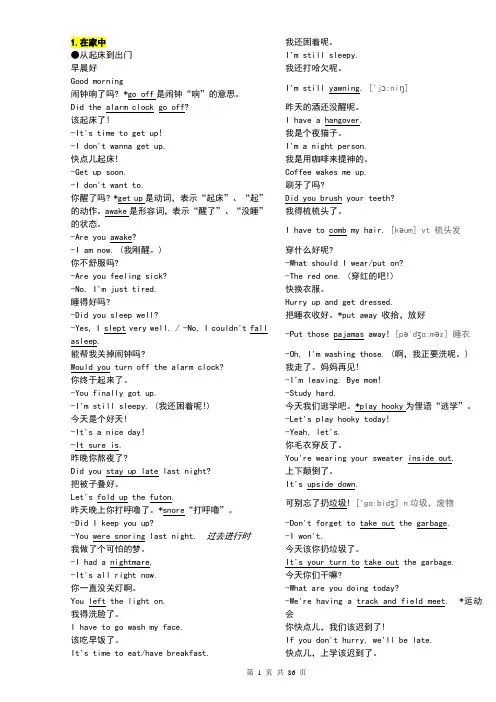
1.在家中●从起床到出门早晨好Good morning闹钟响了吗? *go off是闹钟“响”的意思。
Did the alarm clock go off?该起床了!-It's time to get up!-I don't wanna get up.快点儿起床!-Get up soon.-I don't want to.你醒了吗? *get up是动词,表示“起床”、“起”的动作。
awake是形容词,表示“醒了”、“没睡”的状态。
-Are you awake?-I am now. (我刚醒。
)你不舒服吗?-Are you feeling sick?-No, I'm just tired.睡得好吗?-Did you sleep well?-Yes, I slept very well. / -No, I couldn't fall asleep.能帮我关掉闹钟吗?Would you turn off the alarm clock?你终于起来了。
-You finally got up.-I'm still sleepy. (我还困着呢!)今天是个好天!-It's a nice day!-It sure is.昨晚你熬夜了?Did you stay up late last night?把被子叠好。
Let's fold up the futon.昨天晚上你打呼噜了。
*snore“打呼噜”。
-Did I keep you up?-You were snoring last night. 过去进行时我做了个可怕的梦。
-I had a nightmare.-It's all right now.你一直没关灯啊。
You left the light on.我得洗脸了。
I have to go wash my face.该吃早饭了。
It's time to eat/have breakfast. 我还困着呢。
英语口语学习英语口语8000句大全
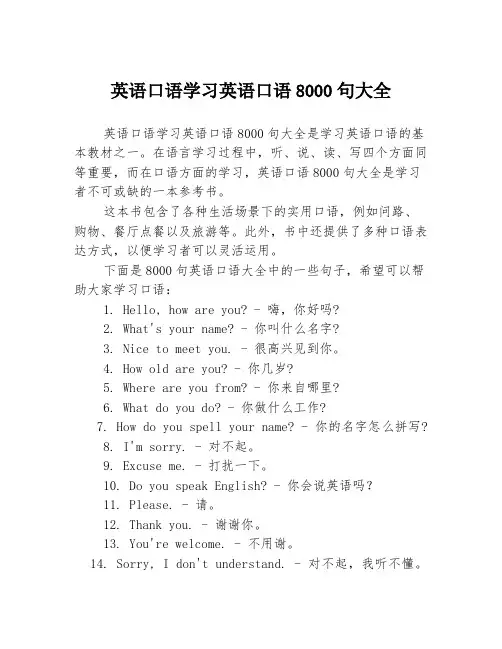
英语口语学习英语口语8000句大全英语口语学习英语口语8000句大全是学习英语口语的基本教材之一。
在语言学习过程中,听、说、读、写四个方面同等重要,而在口语方面的学习,英语口语8000句大全是学习者不可或缺的一本参考书。
这本书包含了各种生活场景下的实用口语,例如问路、购物、餐厅点餐以及旅游等。
此外,书中还提供了多种口语表达方式,以便学习者可以灵活运用。
下面是8000句英语口语大全中的一些句子,希望可以帮助大家学习口语:1. Hello, how are you? - 嗨,你好吗?2. What's your name? - 你叫什么名字?3. Nice to meet you. - 很高兴见到你。
4. How old are you? - 你几岁?5. Where are you from? - 你来自哪里?6. What do you do? - 你做什么工作?7. How do you spell your name? - 你的名字怎么拼写?8. I'm sorry. - 对不起。
9. Excuse me. - 打扰一下。
10. Do you speak English? - 你会说英语吗?11. Please. - 请。
12. Thank you. - 谢谢你。
13. You're welcome. - 不用谢。
14. Sorry, I don't understand. - 对不起,我听不懂。
15. Can you repeat that, please? - 你能再说一遍吗?16. Could you speak a little more slowly? - 你能说慢一点吗?17. Where is the restroom, please? - 请问洗手间在哪里?18. How much does it cost? - 这个要多少钱?19. What time is it? - 现在几点?20. I like your shirt. - 我喜欢你的衬衫。
常用英语口语8000句-可打印
第01天1. With my own ears I clearly heard the heart beat of the nuclear bomb.我亲耳清楚地听到原子弹的心脏的跳动。
2. Next year the bearded bear will bear a dear baby in the rear. 明年,长胡子的熊将在后方产一头可爱的小崽.3. Early I searched through the earth for earthware so as to research in earthquake.早先我在泥土中搜寻陶器以研究地震.4. I learn that learned earnest men earn much by learning.我得知有学问而认真的人靠学问挣很多钱.5. She swears to wear the pearls that appear to be pears.她发誓要戴那些看起来像梨子的珍珠。
6. I nearly fear to tear the tearful girl’s test paper.我几乎害怕撕那个泪流满面的女孩的试卷.7. The bold folk fold up the gold and hold it in hand.大胆的人们将黄金折叠起来拿在手里。
8. The customers are accustomed to the disgusting custom.顾客们习惯了令人讨厌的风俗.9. The dust in the industrial zone frustrated the industrious man.工业区里的灰尘使勤勉的人灰心.10. The just budget judge just justifies the adjustment of justice.公正的预算法官只不过为司法调整辩护而已。
英语口语常用八千句
英语口语常用八千句英语口语是我们在日常交流中经常使用的一种语言。
掌握好英语口语能够帮助我们与来自不同国家的人更好地沟通和交流。
下面是一些常用的英语口语句子,希望对大家有所帮助。
1. How are you? - 你好吗?2. What's your name? - 你叫什么名字?3. Where are you from? - 你来自哪里?4. Can you speak English? - 你会说英语吗?5. What do you do for a living? - 你是做什么工作的?6. How old are you? - 你多大了?7. What's your favorite food? - 你最喜欢的食物是什么?8. Where do you live? - 你住在哪里?9. How was your day? - 你今天过得怎么样?10. What's your hobby? - 你的爱好是什么?11. Can you help me, please? - 请问你能帮个忙吗?12. What's the weather like today? - 今天天气怎么样?13. Do you like traveling? - 你喜欢旅行吗?14. How do you get to work? - 你是怎么上班的?15. What time is it? - 现在几点了?16. Do you have any siblings? - 你有兄弟姐妹吗?17. What's your favorite movie? - 你最喜欢的电影是什么?18. Have you ever been to China? - 你去过中国吗?19. Can you recommend a good restaurant? - 你能推荐一个好的餐厅吗?20. Are you free this weekend? - 你这个周末有空吗?21. What's your favorite color? - 你最喜欢的颜色是什么?22. How do you say this in English? - 这个用英语怎么说?23. Would you like to go out for dinner? - 你愿意出去吃晚餐吗?24. What's your dream job? - 你的理想工作是什么?25. Can I have a glass of water, please? - 请给我一杯水好吗?26. Do you have any pets? - 你养宠物吗?27. Where did you go on your last vacation? - 你上次去哪里度假了?28. How do you spend your weekends? - 你周末都怎么过?29. What's your favorite book? - 你最喜欢的书是什么?30. Can I borrow your pen? - 我可以借你的笔用一下吗?这些句子是我们在日常生活中经常使用的英语口语,掌握它们可以让我们更好地与他人交流。
英语口语8000句文本(全).pdf
英语口语8000句(1)在家中●从起床到出门Good morning, mom.早晨好,妈妈。
Did the alarm clock go off ? 闹钟响了吗?Did the alarm clock buzz?Did the alarm clock ring?It's time to get up!该起床了!I don't wanna get up.我真不想起。
wanna=want to; gonna=be going to美语口语常用说法It's time to get ready.Get up soon. 快点儿起床!I don't want to.我真不想起。
Are you awake?你醒了吗?I am now. 我刚醒。
Are you feeling sick?你不舒服吗?No, I'm just tired. 没有,只是有点儿累Did you sleep well?睡得好吗?Yes, I slept very well. 嗯,睡得挺好。
No, I couldn't fall asleep.哪儿啊几乎没睡着Would you turn off the alarm clock?Please turn off the alarm clock.You finally got up. 你终于起来了。
It's a nice day! 今天是个好天!It sure is. 是不错啊。
It's a beautiful day!It's a wonderful day!It's a great day!Did you stay up late last night?Did you go to bed late last night?Let's fold up the futon. 把被子叠好Let's put the futon away. 把被子收起You were snoring last night. 打呼噜Did I keep you up?影响你睡觉了吗?I had a nightmare. 我做了个可怕的梦It's all right now. 现在没事了/挺好的You left the light on.你一直没关灯啊You forgot to turn off the light.你忘关灯了I have to go wash my face. 我得....It's time to eat breakfast.It's time to have breakfast.I'm still sleepy.I'm still drowsy. I'm still yawning. 我还打哈欠呢I have a hangover. 昨天的酒还没醒呢I'm a night person.我是个夜猫子--I'm not.I'm a morning person. 我喜欢早起。
英语常用口语8000句
英语常⽤⼝语8000句 我们学英语⽬的就是能与⼈沟通,所以学好英语⼝语很重要。
我们在⽣活中要勇敢地与⼈说英语,说错没关系,重要的是你有勇⽓。
下⾯是yjbys⽹店铺整理的'8000句英语⼝语⽂本,如果你能说得流利,你的英语⼝语应该没有什么问题的呢。
再找个⽼外互动⼀下,练⼝语更是事半功倍。
第⼀章 ⽇常⽣活中使⽤的短句 (1) 在家中 ●从起床到出门 Good morning, mom. 早晨好。
Did the alarm clock go off? Did the alarm clock buzz? Did the alarm clock ring? 闹钟响了吗? It's time to get up! 该起床了! I don't want to get up. 我真不想起。
want to=want to; going to=be going to美语⼝语常⽤说法 It's time to get ready. Get up soon. 快点⼉起床! I don't want to. 我真不想起。
Are you awake? 你醒了吗? I am now. 我刚醒。
Are you feeling sick? 你不舒服吗? No, I'm just tired. 没有,只是有点⼉累 Did you sleep well? 睡得好吗? Yes, I slept very well. 嗯,睡得挺好。
No, I couldn't fall asleep.哪⼉⼏乎没睡着 Would you turn off the alarm clock? Please turn off the alarm clock. 能帮我关掉闹钟吗? You finally got up. 你终于起来了。
It's a nice day! 今天是个好天! It sure is. 是不错啊。
- 1、下载文档前请自行甄别文档内容的完整性,平台不提供额外的编辑、内容补充、找答案等附加服务。
- 2、"仅部分预览"的文档,不可在线预览部分如存在完整性等问题,可反馈申请退款(可完整预览的文档不适用该条件!)。
- 3、如文档侵犯您的权益,请联系客服反馈,我们会尽快为您处理(人工客服工作时间:9:00-18:30)。
常用英语口语8000句:说考试TextOn Eggs and ExamsI've been acting like an egg striking a rock. What isthis egg? It's the campaign against the old-fashioned way of teaching . And what' s the rock? It' s the old-fashioned way of setting exams. So long as the old type of I.R. examination remains in force, the campaign against the old method of teaching I.R. can't win. It's like an egg striking a rock. Many people agree: Yes, this old-fashioned I.R. (OFIR) is certainly intensive; it calls for most intensive work by the students. But it doesn't teach them how to read. The more intensively the students study, the fewer books they read. And OFIR doesn't teach them language well either. Learning a language means learning to use it. OFIR doesn't do that. It teaches mainly about the language.Well, if so many teachers and students agree that OFIR doesn't teach people how to read, why aren't they willing to give it up? Because of that rock - the rock of the old examination system. If that rock is not smashed, the egg is smashed. The campaign against OFIR can't be won.Many I. R. exams, until now, have actually includec reading material studied during the term. Does that examim how well the students have learnt to read? No. It examine how well they have learnt by heart the reading texts and the explanations the teacher has given them. A student might ge high marks on such .a test without having learnt to read much better than before she took the course. A true test wouldconsist of unseen passages. That would show how well a studew could read and how much she had learnt.Is that so important? Yes. A college student should know how to read and should learn to read much and fast. She should, on graduation, have read hundreds and hundreds of pages, dozens and dozens of books. . How else can our students inherit the knowledge that mankind has gained through the ages? For that is what China must do in order to modernize.Of course, reading in itself is not enough. We must think - think about what we read and analyze its content, idea:and ap.proach. “Cultivate the habit of analysis.” That is the aim of education. But we must have something solid to analyze. We must have some knowledge of the world, of nature, of society, past and present, Chinese and foreign. So we must read much. Therefore we must learn to read fast.Naturally, we do need to know something about the language. We do need to know some grammar. But grammar is only a means to an end, not an end in itself. For grammar, after all, is theory. And “what is theory for and where does it come from ?It comes from practice and serves practice.” The same applies to grammar. So we need to do some intensive reading for the sake of extensive reading, for the sake of reading whole articles, whole books. A little theory goes a long way. The final test is practice.True, reading is far from the only source of knowledge. Reading without observing life and taking part in life, without experimenting, will produce bookworms, not modernizers. This does not show that all kinds of I. R. areabsolutely useless and should be scrappeds. Some I . R .should be kept but it should be kept within limit. It should not be “the super-power course”, riding roughshod over the language curriculum and taking over most of the timetable.And what I . R . we keep and teach should not be so long andso hard that the teacher is forced to use the duck-stuffing, lecturing method. And it should not just focus on “words, words, words ”。
It should focus on meaning, on ideas, on understanding, on communication - on forests as well as on trees.But as long as students are forced to get good marks in order to get good jobs; and as long as teachers want their students to get good marks so that they themselves can gain fame as good teachers, then everything depends on examinations. It depends on what sort of exams w e teachersset and the educational authorities demand. Until we reformour exams we can hardly reform our teaching methods. So let's launch a new campaign, to discuss and reform the exam system;and at the same time continue the campaign against OFIR, the super-power. We need to fight on two fronts at once.Otherwise we'll be eggs striking rocks.II. ReadRead the following passages. Underline the important viewpoints while reading. l. Different Views about ExaminationsJohn: Examinations do more harm than good!Michae: I agree. We spend so much time revising for examinations that we haven't enough time for new work!Joan: I don't agree. Without exams, no one would do any revision. We would soon forget everything. Linda: That's right. The only time I do any work is when there's going to be an exam! That's true of everyone, isn't it?John: No, I don't think so. Many people work steadilyall the time, and they remember what they learn. That'sbetter than doing no work for weeks and then working allnight before the examination. If there were no exams, more people would work like that, don't you agree?Joan: No, I don't think so. I think many people wouldn't do any work at all. I know I wouldn't. Linda: Of course not. Besides, without exams, how could an employer decide whether to give us jobs?John: The teachers could write reports about us. Examinations can be unreliable, don't you think so? Our teachers know as well, don't they?Linda: Yes, they do. That's why I would rather have an examination!。
